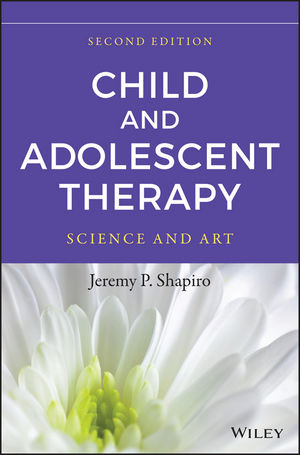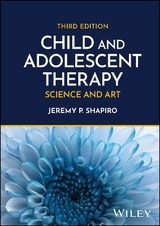
Child and Adolescent Therapy
John Wiley & Sons Inc (Verlag)
978-1-118-72211-4 (ISBN)
- Titel erscheint in neuer Auflage
- Artikel merken
Comprehensive introduction to the theory and practice of therapy Child and Adolescent Therapy: Science and Art, Second Edition relies on both psychotherapy research and clinical expertise to create a comprehensive guide to evidence-based practice for providers of child and adolescent therapy. It includes explanations of all major theoretical orientations and the techniques associated with each, with application to the major diagnostic categories. This updated Second Edition includes a new chapter on Mindfulness-Based Cognitive-Behavioral Therapies (Dialectical Behavior Therapy and Acceptance and Commitment Therapy), incorporation of recent neuroscience research, instruction in Motivational Interviewing, and guidance in using therapeutic diagrams with young clients.
The book models the thought process of expert therapists by describing how the science and art of therapy can be combined to provide a strong basis for treatment planning and clinical decision-making. Theoretical concepts, empirically supported treatments, and best practices are translated into concrete, detailed form, with numerous examples of therapist verbalizations and conversations between counselor and client. Child and Adolescent Therapy: Science and Art, Second Edition:
Explains the work of therapists from the ground up, beginning with fundamentals and moving on to advanced theory and technique
Covers the major theoretical approaches: behavioral, cognitive, mindfulness-based, psychodynamic, constructivist, and family systems
Guides therapists in planning effective treatment strategies with balanced consideration of outcome research, cultural factors, and individual client characteristics
Connects treatment planning with the diagnostic characteristics of the major child and adolescent disorders
For both students and skilled clinicians looking for new ideas and techniques, Child and Adolescent Therapy: Science and Art, Second Edition offers a thorough, holistic examination of how best to serve young therapy clients.
JEREMY P. SHAPIRO, PHD, is a Clinical Child Psychologist and an Adjunct Faculty Member of the Psychology Department and Mandel School of Applied Social Sciences at Case Western Reserve University.
Preface: The Therapist’s Challenge xi
Acknowledgments xiii
Part I The Tools Of The Therapist
1 Therapy Fundamentals 3
The Therapeutic Orientation Toward Clients 4
Getting Started 8
Basic Child Therapy Skills 13
Overcoming Obstacles to Client Engagement 25
Simple Therapeutic Interventions 33
Therapeutic Collaborations 37
Termination 39
Summary 41
2 Behavior Therapy 43
Learning Theory 44
Assessment and Case Formulation 50
Change Processes 54
Outcome Research 55
The Therapist’s Style 58
Exposure 59
Contingency Contracting 60
Relaxation Training 67
Social Skills Training 69
Summary 73
3 Cognitive Therapy 75
Cognitive Theory 76
Assessment and Case Formulation 82
Change Processes 86
Outcome Research 87
The Therapist’s Style 89
Self-Monitoring 91
Self-Instruction 93
Self-Reinforcement 94
Socratic Questioning 96
Cognitive Restructuring 98
Tests of Evidence 100
Personal Experiments 103
Using Spectra to Develop Moderation 104
Summary 108
4 Mindfulness-Based Cognitive-Behavioral Therapies 110
Mindfulness and Psychotherapy 111
What Causes Mental Health Problems? 115
Assessment and Case Formulation 117
Change Processes 121
Outcome Research 124
The Therapist’s Style 127
Mindfulness Training Exercises 128
Implementation of Dialectical Behavior Therapy 132
Implementation of Acceptance and Commitment Therapy 141
Summary 147
5 Psychodynamic Therapy 149
Psychoanalytic Theory 150
Assessment and Case Formulation 161
Change Processes 163
Outcome Research 168
The Therapist’s Style 170
Facilitating Expression of Material 171
Interpretation and Insight 172
Dynamic Psychoeducation 176
Corrective Emotional Experience 179
Summary 181
6 Constructivism: Solution-Focused and Narrative Therapy 184
Postmodernism and the Social Construction of Reality 185
Assessment and Case Formulation 189
Change Processes 192
Outcome Research 196
The Therapist’s Style 198
Solution-Focused Techniques 199
Narrative Therapy Techniques 208
Summary 215
7 Family Systems Therapy 218
Systems Theory 219
Assessment and Case Formulation 227
Change Processes 230
Outcome Research 233
The Therapist’s Style 234
Combining Family and Individual Modalities 235
Facilitating Communication 235
Systemic Insight 237
Reframing 238
Treating Enmeshment and Disengagement 242
Therapist Directives 243
Treating Positive Feedback Loops 245
Summary 250
8 Atheoretical and Transtheoretical Techniques 253
Miscellaneous Techniques 254
Parent Counseling 259
Balance Between Extremes 261
Psychoeducation 265
Values in Psychotherapy 272
Incorporating Experiences Into New Structures of Meaning 277
Overcoming Fear of Failure 288
Summary 293
Part II The Needs Of Clients
9 Cultural Factors in Therapy 297
The Role of Culture in Psychotherapy 298
Assessment and Case Formulation 307
The Therapist’s Style 314
Connecting the Cultures of Therapy and Client 315
Conflicts Between Client Cultures and the Predominant Culture 318
Addressing Prejudice and Discrimination 319
Culturally Specific Adaptations of Therapeutic Approaches 320
Bringing Spirituality Into Therapy 321
Summary 324
10 Disruptive Behavior in Children 326
Diagnoses Treated in This Chapter 327
Clinical Presentation and Etiology 327
Assessment 332
Treatment Planning 333
Behavioral-Systemic Parent Training 339
Collaborative Problem Solving 352
Individual CBT With the Child 355
Psychodynamic Therapy 358
Summary 359
11 Disruptive Behavior in Adolescents 362
Diagnoses Treated in This Chapter 363
Clinical Presentation and Etiology 363
Assessment 369
Treatment Planning 370
Behavioral-Systemic Therapy 374
Psychodynamic Therapy 391
Parent Counseling 393
Summary 394
12 Aggression and Violence 396
Diagnoses Treated in This Chapter 397
Clinical Presentation and Etiology 397
Assessment 402
Treatment Planning 403
Addressing Decisions About Fighting 406
Cognitive-Behavioral Therapy 410
Psychodynamic Therapy 426
Systems-Oriented Intervention 427
Summary 428
13 Anxiety 430
Diagnoses Treated in This Chapter 431
Clinical Presentation and Etiology 432
Assessment 438
Treatment Planning 440
Cognitive-Behavioral Therapy 443
Psychodynamic Therapy 453
Parent-Child Work 458
Summary 461
14 Depression 463
Diagnoses Treated in This Chapter 464
Clinical Presentation and Etiology 465
Assessment 471
Treatment Planning 472
Special Topic: Suicide Risk 476
Cognitive-Behavioral Therapy 479
Psychodynamic Therapy 489
Systemic Intervention 493
Summary 494
15 Stress and Trauma 497
Diagnoses Treated in This Chapter 498
Clinical Presentation and Etiology 498
Assessment 504
Treatment Planning 506
Cognitive-Behavioral Therapy 509
Coaching Clients in Coping 515
Psychodynamic Therapy 518
Constructivist Therapy 518
Systems-Oriented Intervention 519
Therapy for Parental Divorce 520
Therapy for Bereavement 522
Therapy for Sexual Abuse 525
Summary 530
Afterword: The Therapist’s Experience 533
References 537
Author Index 613
Subject Index 635
| Erscheint lt. Verlag | 9.10.2015 |
|---|---|
| Verlagsort | New York |
| Sprache | englisch |
| Maße | 188 x 257 mm |
| Gewicht | 1157 g |
| Themenwelt | Geisteswissenschaften ► Psychologie |
| Medizin / Pharmazie ► Medizinische Fachgebiete ► Pädiatrie | |
| Medizin / Pharmazie ► Medizinische Fachgebiete ► Psychiatrie / Psychotherapie | |
| ISBN-10 | 1-118-72211-6 / 1118722116 |
| ISBN-13 | 978-1-118-72211-4 / 9781118722114 |
| Zustand | Neuware |
| Haben Sie eine Frage zum Produkt? |
aus dem Bereich



